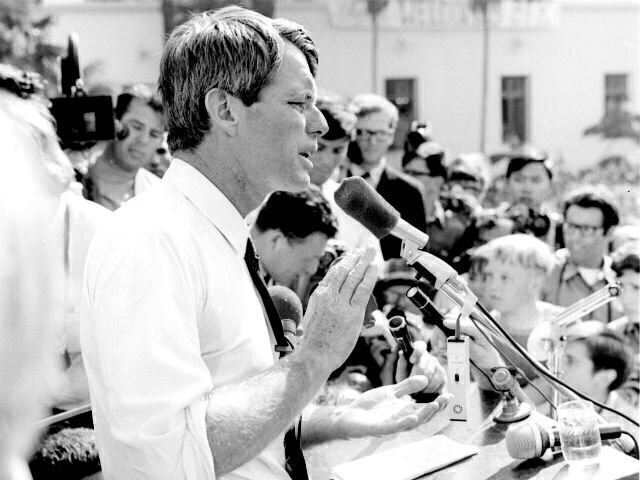
On June 8, 1968, Robert F. Kennedy was buried at Arlington National Cemetery after a televised funeral at St. Patrick’s Cathedral in New York City.
In 1968, one of the most tumultuous years in American history, two civil rights visionaries were assassinated: Kennedy and Martin Luther King, Jr. RFK, who was shot by Sirhan Sirhan at the Ambassador Hotel in Los Angeles, was laid to rest just a day shy of the three-month anniversary of MLK’s funeral in Atlanta.
In the wake of King’s assassination in Memphis and the subsequent nationwide riots that followed, RFK seemed a promise of peace. Kennedy, who ardently opposed the Vietnam War, organized crime and segregation, was favored to clinch the 1968 Democratic nomination for the presidency at the time of his passing.
The nation was still mourning King. The Kings’ and the Kennedys’ paths had crossed throughout the decade, both prioritizing civil rights as a moral issue. During John F. Kennedy’s 1960 campaign, Bobby had secured King’s release from prison. Later, U.S. Representative John Lewis, recipient of the 2016 Liberty Medal, remembered, “[MLK] was so moved by the speech that President Kennedy had delivered on June 12th, 1963, when he said the question of civil rights was a moral issue.” Following and perhaps a result of JFK’s assassination later that year, the Civil Rights Act was pushed through by Lyndon B. Johnson as a fruition of the New Frontier
The families, originally joined by a shared vision and mutual respect, were bound later by tragedy and reciprocal empathy. Jacqueline Kennedy was famously photographed with Coretta Scott King at the “I Have a Dream” leader’s Atlanta funeral. It seemed incomprehensible that Robert Kennedy would soon join this group.
The funeral Mass began in the morning. Thousands attended. Andy Williams sang “Battle Hymn of the Republic.” Ethel Kennedy, pregnant with her eleventh child, was veiled in black. If John F. Kennedy Jr.’s salute is what etched the late president’s funeral in the memory of millions, then it was Teddy’s eulogy that memorialized Bobby’s.
“We loved him as a brother, and as a father, and as a son. From his parents, and from his older brothers and sisters—Joe and Kathleen and Jack,” his voice cracking on Jack, whose funeral just five years back must have made the one at hand seem a bizarre bout of déjà vu. “[Bobby] received an inspiration which he passed on to all of us.”
He went on, “My brother need not be idealized, or enlarged in death beyond what he was in life; to be remembered simply as a good and decent man, who saw wrong and tried to right it, saw suffering and tried to heal it, saw war and tried to stop it.” The famous eulogy (whether or not legendary Kennedy speechwriter Ted Sorensen helped craft it is subject to speculation) concluded, “As he said many times, in many parts of this nation, to those he touched and who sought to touch him: ‘Some men see things as they are and say why. I dream things that never were and say why not.’”
Following the custom of President Abraham Lincoln’s funeral, RFK traveled by train from New York to Washington, where thousands gathered around the tracks to pay their respects. According to biographer Evan Thomas, Arthur Schlesinger observed the “marvelous crowds,” to which another Kennedy insider, Kenny O’Donnell, remarked, “But what are they good for now?”
The reality was that Bobby’s campaign had come to a screeching halt. His life had, too. The former attorney general and U.S. senator from New York was buried 30 yards from his older brother. His resting place is marked by a simple white cross.
For better or for worse, things were never the same. Just as President William McKinley’s assassination in 1901 spurred the development of a more formal Secret Service, Bobby Kennedy’s death prompted an extension of Secret Service security to major presidential and vice presidential candidates. This measure was approved by Congress shortly after his passing.
As election season intensifies, today’s candidates can trace the sense of safety they enjoy back to Robert F. Kennedy himself, a father, brother, husband and friend who until his dying day was unapologetically a public servant.
Olivia Fitzpatrick is an intern at the National Constitution Center. She is also a rising junior at the University of Pennsylvania, majoring in English and minoring in Legal Studies.







